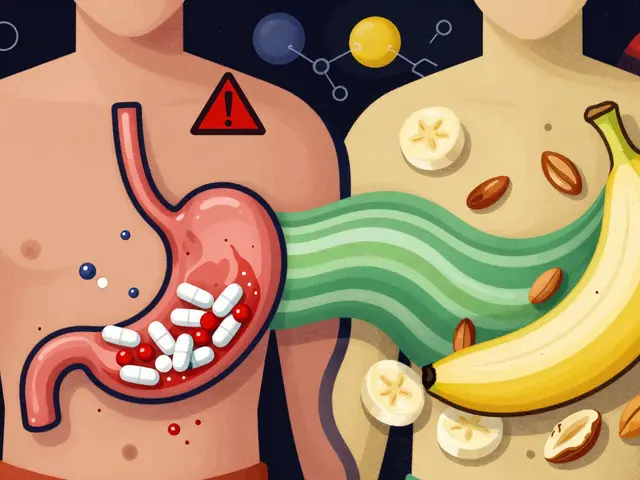Hydration: How to Stay Hydrated and Why It Matters
Ever feel tired, lightheaded, or just groggy for no obvious reason? You might be low on fluids. Hydration does a lot more than stop thirst — it helps your brain work, your muscles recover, and your meds behave the way they should. This page gives clear, practical tips you can use today.
Quick hydration checklist
Want a simple plan? Try these easy moves:
- Carry a reusable water bottle and sip often — small, steady sips beat chugging.
- Use urine color as a guide: pale yellow is good; dark means drink more.
- Add water-rich foods: cucumbers, watermelon, oranges, soups and yogurt add fluids without thinking.
- After heavy sweating, replace salt and minerals with an electrolyte drink or a pinch of salt plus a sports drink.
- Limit drinks that dry you out: alcohol and lots of caffeine can increase fluid needs.
For most adults, aiming for regular drinking through the day is better than trying to hit a strict number. If you exercise, are in hot weather, or have fever or vomiting, increase intake.
Medications and fluids — what to watch for
Some medicines change how much fluid your body needs. Diuretics ("water pills") make you lose salt and water faster. Lithium and certain blood pressure drugs also react to fluid levels. If you’re taking these, check with your doctor about how much to drink and whether you need extra salt or lab tests.
A quick rule: don’t change how much water you drink right after starting or changing doses of a medicine without asking your provider. Small shifts in hydration can change drug levels in your blood.
Signs you’re mildly dehydrated are simple: dry mouth, darker urine, feeling tired or dizzy. More serious signs need medical help — very little urine for 12 hours, confusion, fainting, or a fast heartbeat. Babies who aren’t peeing or have a sunken soft spot need urgent care.
Worried about overdoing it? Drinking extreme amounts of plain water during endurance events can lower blood sodium (hyponatremia). Balance fluids with electrolytes if you’re sweating heavily for long periods.
Practical tools that help: phone reminders, flavoring water with lemon or berries, and splitting intake into set times (morning, mid-morning, lunch, mid-afternoon, evening). For older adults, caregivers should check fluid intake regularly because thirst response weakens with age.
Final tip: make hydration part of a routine, not a chore. Pair a glass of water with daily habits — after brushing your teeth, before meals, and when you walk in the door. Little habits add up and keep you feeling sharper, calmer, and more energetic.

The Role of Hydration in Preventing Mountain Sickness
As a blogger, I can't stress enough the importance of staying hydrated when embarking on mountain adventures. Hydration plays a crucial role in preventing mountain sickness, which is caused by a lack of oxygen at high altitudes. Drinking plenty of water helps maintain proper circulation and aids in the acclimatization process. Additionally, staying hydrated can reduce symptoms like headaches, dizziness, and fatigue. So remember, pack your reusable water bottle and drink up when conquering those peaks!
read more




